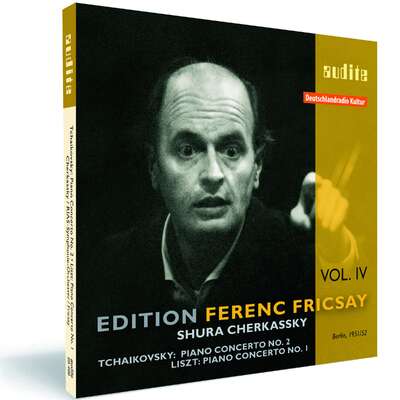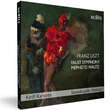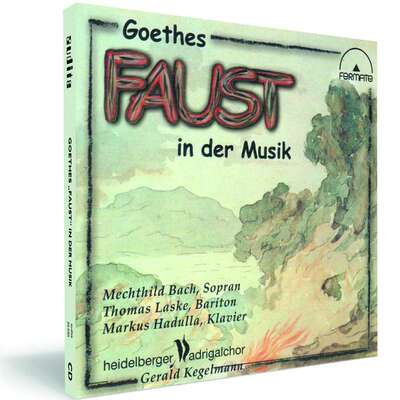
Mit Liszts Faust-Symphonie hält die Psychologie Einzug in die Musik. Sie zeigt die Macht der Töne, der Tonmalerei, eine fantastische, epische und psychologische Welt zu evozieren. Mit seiner subtilen und analytischen Auslegung von Goethes Faust schafft Liszt klingende psychologische Tableaus, eingespielt von der dem Werk besonders verbundenen Staatskapelle Weimar unter Leitung von Kirill Karabits.mehr
Staatskapelle Weimar | Herren des Opernchores des Deutschen Nationaltheaters Weimar | Herren des Landesjugendchores Thüringen
Kirill Karabits
Mit Liszts Faust-Symphonie hält die Psychologie Einzug in die Musik. Sie zeigt die Macht der Töne, der Tonmalerei, eine fantastische, epische und psychologische Welt zu evozieren. Mit seiner subtilen und analytischen Auslegung von Goethes Faust schafft Liszt klingende psychologische Tableaus, eingespielt von der dem Werk besonders verbundenen Staatskapelle Weimar unter Leitung von Kirill Karabits.
Titelliste
Diesen Bonustrack erhalten Sie ausschließlich als Download!
Details
| Franz Liszt: A Faust Symphony, S. 108 – Mephisto Waltz No. 3, S. 216 | |
| Artikelnummer: | 97.761 |
|---|---|
| EAN-Code: | 4022143977618 |
| Preisgruppe: | BCA |
| Veröffentlichungsdatum: | 4. August 2023 |
| Spielzeit: | 95 min. |
Zusatzmaterial
Informationen
Als Franz Liszt 1848 das Hoforchester in Weimar übernimmt, lebt man dort von der Erinnerung an Goethe, der das Hoftheater zuvor geleitet hatte. Liszt ist der direkte Erbe dieser renommierten Bühne - allerdings als Musiker. Mit seiner Faust-Symphonie, die am selben Tag uraufgeführt wurde, an dem die Einweihung des Goethe- und Schiller-Denkmals vor dem Theater stattfand, hält die Psychologie Einzug in die Musik; Liszts Bestreben war die „Erneuerung der Musik durch ihre innigere Verbindung mit der Poesie". Die Faust-Symphonie zeigt die Macht der Töne, der Tonmalerei, eine fantastische, epische und psychologische Welt zu evozieren.
Jeder Satz entspricht einer Figur, deren Charakter und Psychologie er schildert. Das ist zwar Programmmusik, aber sie erzählt keine Geschichte und ist schon gar nicht deskriptive Musik. Liszt beschreibt die tiefgründige Natur der Charaktere musikalisch und bietet so eine subtile und analytische Auslegung der Geschichte von Faust, wie Goethe sie erzählt hat. Die drei Charakterbilder sind klingende psychologische Tableaus, in denen Liszt nicht einfach die Geschichte der Figuren erzählt oder ihre Gefühle beschreibt: Er evoziert ihre Psyche.
Kirill Karabits leitet die Staatskapelle Weimar in diesem sie so prägenden Repertoire.
Besprechungen
Das Orchester | I/2024 | Gerhard Anders | 1. April 2024 | Quelle: https://dasorche...
Wie grandios er dieses Vorhaben in die Tat umgesetzt hat, macht die exzellente Neuaufnahme mit der Staatskapelle Weimar unter Leitung des ehemaligen Weimarer Generalmusikdirektors Kirill Karabits facettenreich hörbar: [...] Dem immensen Spektrum des Werks geben Orchester und Dirigent beeindruckende Gestalt.Mehr lesen
klassik.com | 23.01.2024 | Dr. Kai Marius Schabram | 23. Januar 2024 | Quelle: https://magazin.... Dämonen und Engel
[Karabits] Aufnahme der kanonischen Faust-Symphonie mit der glänzend aufgelegten Weimarer Staatskapelle unter Beteiligung des Opernchors des Deutschen Nationaltheaters Weimar und des Landesjugendchors Thüringen [ist] durchaus besonders zu nennen. [...] Hier entstehen jene Momente, die große Meisterwerke ausmachen – man glaubt sie zu kennen, doch wird man durch Interpretationen wie jene von Karabits und dem Weimarer Klangkörper beständig eines Besseren belehrt. Mehr lesen
Preis der Deutschen Schallplattenkritik | Bestenliste 4/2023 | Michael Kube | 15. November 2023 | Quelle: https://www.scha... Bestenliste 4/2023 Preis der Deutschen Schallplattenkritik
Liszts Tondichtung »Eine Faust-Sinfonie« gehört wie auch viele andere seiner Partituren zu den ungehobenen Schätzen des 19. Jahrhunderts. NurMehr lesen
Diapason | N° 727 NOVEMBRE 2023 | Didier Van Moere | 1. November 2023
Kirill Karabits poursuit son périple en terres lisztiennes . Après l’exhumation de l’opéra inachevé Sardanapalo (Diapason découverte, cf. n°Mehr lesen
Classica – le meilleur de la musique classique & de la hi-fi | N° 257 - Novembre 2023 | Jérémie Bigorie | 1. November 2023
Kirill Karabits s’inscrit dans cette seconde lignée, avec un troisième mouvement particulièrement réussi où une mise en place au cordeau s’acoquine avec l’esprit méphistophélique. Sa direction à la pointe sèche épure le romantisme de l’œuvre qui regarde moins vers le fondu wagnérien qu’elle ne perpétue, dans la netteté du dessin, un certain classicisme hérité de BerliozMehr lesen
www.musicweb-international.com | OCTOBER 12, 2023 | Jonathan Welsh | 12. Oktober 2023 | Quelle: https://www.musi...
I’ve long been a fan of Liszt’s Faust Symphony and up until recently it was my favourite of his two symphonies. In fact, it was KirillMehr lesen
As I had expected from the recording of the Dante, the performance of the Faust Symphony is muscular and powerful – but there is also a delicacy when that is required. The first movement, subtitled “Faust”, starts with a twelve-tone row, played fairly slowly and mysteriously, leaving you wondering where the music will go next. However, once the initial tune gets going, the tempo picks up rapidly. The orchestra positively explodes from the speakers with the following “Allegro impetuoso”, which sets off at a tremendous pace with the first of several themes that permeate and create the movement. The details captured by the excellent recording here make Liszt’s clever writing for orchestra stand out very clearly and also highlight the difficulties in the orchestral parts for the performers. However, this clearly doesn’t faze the orchestra as they cope marvellously with all the complications that Liszt throws at them. The music slowly evolves into muted runs in the strings which abruptly stop with a lovely “Affettuoso poco andante” section. This slowly morphs into a section that generates what has been termed the “Pride” motif, which shows Liszt as his most bombastic. This doesn’t last long and is transmuted and mixed with themes from earlier in the movement to create something entirely different. Somehow, Liszt (and Karabits) manage to contain all this tension and we get a repeat of the “Allegro impetuoso”, then the twelve-tone rows return, about fourteen minutes in. This section serves as a bridge to the remainder of this long and complicated movement that is broadly in sonata form – all of which means that the themes which have already been heard are varied and changed and wound up neatly in an effective and unexpected quiet conclusion.
The second movement, “Gretchen”, opens with the violas and oboes sinuously playing her theme with beautiful accompaniment by the remainder of the orchestra. Much of this movement is gentle with some lovely writing and playing; however, there is a more strident section in the middle which is again very well judged. Unlike the first movement, the timing here is slightly slower than other performances I am familiar with but the music does not drag at all. Towards the end of the movement, just before the violas reappear with the “Gretchen” theme, there is a beautifully recorded moment where the orchestra falls silent aside from a harp. It is magnificently captured here. This is the sort of performance in which you can completely lose yourself and be swept away by the music; I defy any Liszt haters not to be enthralled by it. The movement ends peacefully as the music evaporates into the ether.
In complete contrast to the ending of “Gretchen” the third movement, “Mephistopheles”, is a portrayal of the devil, starting with a jolt. It is very cleverly constructed, made up mostly of thematic transformations of the music heard elsewhere within the symphony, but with the addition of a self-quotation from Liszt’s early work for piano and orchestra, Malediction. In fact, the only theme not mutated during the progress of the movement is “Gretchen” (at 8’41’’) – showing that Mephistopheles has no power over her. This respite does not last long and the sardonic themes return quickly and continue their development. There is some tremendously exciting playing here – the tension inherent in the music is racked up as the piece progresses with scurrying playing in the strings, clever fugal modifications and changes in tempo and orchestration. The work doesn’t really stop here, but slowly crystallises down to a very foreboding couple of bars in which the organ, violins, cellos and double basses hold a note while the chorus and, slightly later, the tenor soloist emerges from the gloom. Both chorus and soloist do a brilliant job here and are marvellously integrated into the orchestra as they sing various passages from the “Chorus mysticus” in which Faust is redeemed. The tenor Airam Hernández is especially good; his voice suits this piece extremely well.
The performance of this symphony is brilliant in every way. I am also very familiar with Liszt’s own two piano version (S647 in Searle’s catalogue) and listening to this recording makes me appreciate the way that Liszt handled that arrangement. The clarity of this performance enables me to mentally connect the music in that two piano version with the orchestral version better than any other I have heard.
There is almost no information in the notes about the orchestration of the Third Mephisto Waltz which is a shame, as I would have liked to have known more about it. However, in comparison to Liszt’s own orchestration of the Second Mephisto waltz, I would say that Reisenauer / Karabits’s arrangement works extremely well indeed – it’s also got some details in the scoring which stand out better than they do in the piano version. It’s a dark, ironic, sarcastic piece – made even darker by the very interesting novel orchestration which is very much in Liszt’s later style. As an aside, it’s a pity Liszt never finished the fourth of this series of works although Dr Leslie Howard’s completion in the Hyperion set gives an excellent idea of what he might have intended. It is conceivable to orchestrate that, too, which would be a most interesting work to hear.
There is some wonderful playing here, the orchestra works well as an integrated whole and you can really hear all the details. The recording is extremely clear and sounds especially good over headphones. Overall timings for the symphony are about average but especially in the first movement, the rhythmic drive propels the music forward in a way that makes time pass more quickly. The cover notes are fascinating and give lots of details about the symphony (although as I said earlier, there is almost nothing about the waltz, sadly). I thoroughly enjoyed getting to know this recording and hope that these forces will record more of Liszt’s orchestral works as there is still quite a lot that has yet to be recorded.
Radio România Muzical | 4-5 octombrie 2023 | Larisa Clempuș | 4. Oktober 2023 | Quelle: https://www.roma... DISCURILE ANULUI 2023
Continuând seria de înregistrări dedicate muzicii lui Franz Liszt laMehr lesen
BBC Music Magazine | October 2023 | John Allison | 1. Oktober 2023
‘What would the history of music look like if Goethe had not written his Faust dramas?’ It’s a good question, posed at the beginning of theMehr lesen
Liszt’s connections with the city ran deep, so it is hardly surprising to hear how even today the Staatskapelle Weimar sounds steeped in his music. The orchestra’s former music director Kirill Karabits has immersed himself in Liszt too, also completing Alfred Reisenauer’s orchestration of the Mephisto Waltz No. 3 and recording it for the first time. In the Faust Symphony, he handles the sprawling and discursive first movement impressively, moving between rumination and headlong energy in this character sketch of Faust. Portraits of Gretchen (full of delicacy) and Mephistopheles follow, and the added apotheosis with male chorus and tenor soloist (Airam Hernández singing with heft) makes for a grandly affirmative ending.
Gramophone | Monday, September 11, 2023 | Christian Hoskins | 11. September 2023 | Quelle: https://www.gram... Editor's Choice: October 2023 | The best new classical recordings
Following his earlier recordings of Liszt’s Sardanapalo (2/19) and A Dante Symphony (4/20) for Audite, Kirill Karabits now turns his attention toMehr lesen
Nevertheless, it’s Bernstein’s vividly characterised and impassioned interpretation that I’m most reminded of when listening to this new recording. The performance of the work’s opening has a compelling sense of mystery and anticipation, and the movement’s subsequent episodes are stirring and dramatic. In the movement’s gentler passages, as in the subsequent ‘Gretchen’ movement, the playing of the viola, oboe and other solo instruments is marvellously poetic, and textures are beautifully balanced and marvellously luminous. Both Bernstein and Karabits offer enormously exciting accounts of the work’s final movement but ultimately Karabits has the edge with his thrilling interpretation of the concluding ‘Chorus mysticus’, which combines an ardent contribution by tenor Airam Hernández with choral singing of extraordinary heft and incandescence.
It’s a pity that the booklet doesn’t include the text of the choral section given that it would take so little space. The booklet essay similarly makes no mention of the rarely heard orchestration of the Mephisto Waltz No 3 included on the album other than giving joint credit for the arrangement to Liszt pupil Alfred Reisenauer and Kirill Karabits. As with the symphony, however, the performance has tremendous panache, and the recording is well balanced and transparent even in the loudest tuttis. Very highly recommended.
Classical Music Magazine | September 5, 2023 | John Allison | 5. September 2023 | Quelle: https://www.clas...
‘What would the history of music look like if Goethe had not written his Faust dramas?’ It’s a good question, posed at the beginning of theMehr lesen
Liszt’s connections with the city ran deep, so it is hardly surprising to hear how even today the Staatskapelle Weimar sounds steeped in his music. The orchestra’s former music director Kirill Karabits has immersed himself in Liszt too, also completing Alfred Reisenauer’s orchestration of the Mephisto Waltz No. 3 and recording it for the first time. In the Faust Symphony, he handles the sprawling and discursive first movement impressively, moving between rumination and headlong energy in this character sketch of Faust. Portraits of Gretchen (full of delicacy) and Mephistopheles follow, and the added apotheosis with male chorus and tenor soloist (Airam Hernández singing with heft) makes for a grandly affirmative ending.
Prestomusic | 31st August 2023 | Katherine Cooper | 31. August 2023 | Quelle: https://www.pres... Editor's Choices
Liszt's orchestral portraits of Faust, Marguerite and Mephistopheles positively leap off the page in this vital, richly characterised account of theMehr lesen
Prestomusic | 18th August 2023 | Katherine Cooper | 18. August 2023 | Quelle: https://www.pres... New Release Round-Up
Following their recordings of Tasso, the Dante Symphony and the abandoned opera Sardanapalo, Karabits and the Weimar orchestra turn to a work which isMehr lesen
concerti - Das Konzert- und Opernmagazin | 15. August 2023 | Roland H. Dippel | 15. August 2023 | Quelle: https://www.conc...
Grübeln und Glanz
Die Staatskapelle Weimar und Kirill Karabits kosten mit Brillanz die Oberflächenreize in Liszts Faust-Sinfonie aus
Das Orchester hat neben der Suche nach Tiefe auch Freude an den Oberflächenreizen Liszts, kostet diese mit heutigem Instrumentarium und entsprechender Brillanz gern aus.Mehr lesen
WDR 3 | 10.08.2023 "Hörstoff – neue Klassik-Alben" | Philipp Quiring | 10. August 2023 | Quelle: https://www.arda...
BROADCAST
Packende Charakterzeichnung: Liszts Faust-Symphonie
Dirigent Kirill Karabits und die Staatskapelle Weimar haben LisztsMehr lesen
Kulturabdruck | 03.08.2023 | Dr. Thorsten Stegemann | 3. August 2023 | Quelle: https://www.kult... Zerbröselnder Faust, träumendes Gretchen und ein lachender Mephisto
Die Staatskapelle Weimar formt die drei Charakterbilder unter ihrem früheren Chefdirigenten Kirill Karabits zu einem gewaltigen Klangporträt, das die flüchtigen lyrischen Momente ebenso präzise nachzeichnet wie die rauschhaften, sich mitunter selbst überschlagenden Aufschwünge. Den Herren des Opernchores des Deutschen Nationaltheaters Weimar und des Landesjugendchores Thüringen gelingt mit dem Tenor Airam Hemandez ebenfalls eine überzeugende Darbietung [...]Mehr lesen
www.pizzicato.lu | 03/08/2023 | Remy Franck | 3. August 2023 | Quelle: https://www.pizz... Liszt, Faust, Weimar
Als Liszt die Leitung der Weimarer Hofoper antrat, setzte er sich intensiv mit Goethes Werk auseinander. Besonders das Faust-Thema fesselte ihn. DieMehr lesen
Er wendet sich freilich nicht, wie es andere Dirigenten getan haben, vom Gedanklichen ab, um das Werk in einem opulenten, brillanten Klanggewand zu dramatisieren. Orchestrale Virtuosität ist zwar reichlich vorhanden und auch bewundernswert, aber sie wird nie zum Selbstzweck.
Sehr tief empfunden ist der Gretchen-Satz, und in der Mephisto-Tondichtung ist die Rhythmik regelrecht faszinierend. Sie ist die Grundlage, auf welcher der Dirigent seine Interpretation aufbaut, die ihm hilft, dämonische Kräfte zu entfesseln, den Geist, der stets verneint, hörbar werden zu lassen.
Das hervorragende Weimarer Orchester unterstützt Karabits dabei sehr gut. Der Tenor Peter Seiffert und die Herren des Senff-Chors leisten eine ebenfalls gute Arbeit.
Zwanzig Jahre trennen den berühmten Mephisto-Walzer Nr. 1 von drei weiteren Walzern aus den 1880er Jahren, den Mephisto-Walzern Nr. 2 (1881), Nr. 3 (1883), Nr. 4 (1885, unvollendet).
Den Mephisto-Walzer Nr. 3 widmete er der französischen Komponistin und Pianistin Marie Jaëll, die nach dem Tod ihres Mannes Alfred im Jahr 1882 Liszts Sekretärin wurde. Dieser dritte Mephisto-Walzer ist etwas weniger virtuos und gleichzeitig moderner, harmonisch kühner als die beiden ersten Walzer. Das wird in dieser Orchesterfassung sehr deutlich, die der Liszt-Schüler Alfred Reisenauer anfertigte, aber unvollendet ließ; sie wurde von Kirill Karabits vervollständigt und am 12. Juni 2022 von der Staatskapelle Weimar uraufgeführt.
ENGLISH TRANSLATION:
When Liszt took over as director of the Weimar Court Opera, he intensively studied Goethe’s work. He was particularly captivated by the Faust theme. The Faust Symphony is actually nothing more than a sequence of three tone poems on the themes of Faust, Gretchen and Mephisto with, as an encore, the Chorus mysticus. Kirill Karabits has the same recipes for the three tone poems: resolute search for dramatic sequences, for program points that should remind of a plot, with all motives and emotional moments connected with it.
He does not, of course, turn away from the thoughtful, as other conductors have done, in order to dramatize the work in an opulent, brilliant sound garb. Orchestral virtuosity abounds and is also admirable, but it never becomes an end in itself.
Very deeply felt is the Gretchen movement, and in the Mephisto tone poem the rhythm is downright fascinating. It is the foundation on which the conductor builds his interpretation, helping him to unleash demonic forces, to make audible the spirit that always denies.
The excellent Weimar orchestra supports Karabits very well. Tenor Peter Seiffert and the gentlemen of the Senff Choir also do a fine job.
Twenty years separate the famous Mephisto Waltz No. 1 from three other waltzes from the 1880s, Mephisto Waltzes No. 2 (1881), No. 3 (1883), No. 4 (1885, unfinished).
He dedicated the Mephisto Waltz No. 3 to the French composer and pianist Marie Jaëll, who became Liszt’s secretary after the death of her husband Alfred in 1882. This third Mephisto waltz is less virtuosic and at the same time more modern and harmonically bold than the first two waltzes. This is very evident in this orchestral version, which Liszt’s student Alfred Reisenauer made but left unfinished; it was completed by Kirill Karabits and premiered by the Staatskapelle Weimar on June 12, 2022.
Papageno | 22. Juli 2023 | Robert Szatmari | 22. Juli 2023 | Quelle: https://papageno... Jugendliche, spritzige Darbietung – Kirill Karabits dirigiert Liszts Faust-Sinfonie
Zwischen 1854 und 1857 schrieb Franz Liszt die Faust-Sinfonie, die die klare Poesie seiner Musik demonstriert und nichts anderes als eine Hommage anMehr lesen
Den grüblerischen Anfang des Stücks, Lento assai, erarbeitet Karabits mit dem Orchester akribisch. Von den vier Faust-Themen erscheint das erste in einer mystisch-suchenden Stimmung, gefolgt von einem energisch gespielten Thema mit leidenschaftlichem Pathos, und das Liebesthema schreitet mit geheimnisvoller Sehnsucht voran. Fausts Tatendrang und Entschlossenheit sind im gesamten ersten Satz spürbar, während es dem Orchester auch gelingt, die in seiner Seele verborgenen inneren Konflikte zu vermitteln.
Der zweite Satz gehört Gretchen (Andante soave). Das berühmte Oboenthema, ergänzt durch die ausdrucksstarke Bratschenbegleitung, kommt in der Aufführung der Staatskapelle Weimar sehr präzise zur Geltung und das einfühlsame, fast jungfräuliche Violinthema prägt den Charakter des Gretchens eindrucksvoll.
Es folgt das teuflische Scherzo, das Allegro vivace ironico. Kirill Karabits Interpretation gewinnt noch einmal deutlich an Dynamik und Tempo. Seine drastischen Lösungen zeichnen ein schillerndes Bild von Mephisto, der sich scheinbar in tausend Formen aufspaltet, und das Orchester funkelt. Jedes Faust-Thema wird frivol karikiert – und selbst die Liebesmelodie wird zur teuflischen Fuge. Nur Gretchens Melodie bleibt unberührt.
Unter der Leitung von Karabits folgt die Staatskapelle Weimar Liszts Partitur mit Brillanz und Anmut. Die mystischen Klänge von Orgel und Streichern bilden die Grundlage des Aufrufs „Alles Vergängliche ist nur ein Gleichnis“ , vorgetragen vom Männerchor des Deutschen Nationaltheaters Weimar und dem Thüringer Landesjugendchor. Die Harmonie ist schon von weitem wahrnehmbar und kann später im „Faust“-Teil von Gustav Mahlers Achter Symphonie deutlich gesteigert werden.
In den klanggewaltigen Schlussakkorden stellt die Staatskapelle Weimar noch einmal ihren Klangreichtum unter Beweis. Und Tenor Airam Hernandez intoniert gemeinsam mit dem Chor geheimnisvoll die letzte Strophe des zweiten Teils von Goethes „Faust“.
Die CD enthält auch den Mephistopheles-Walzer, die wahre Entdeckung ist jedoch die Faust-Sinfonie im jugendlichen, spritzigen Spiel des Weimarer Orchesters unter der Leitung des jungen ukrainischen Dirigenten Karabits.
Crescendo Magazine | 9 juillet 2023 | Pierre Jean Tribot | 9. Juli 2023 | Quelle: https://www.cres... Liszt à Weimar, chef d'oeuvre et découverte
L’interprétation fignolée et brillante du chef et de son orchestre sont un incontestable apport à notre connaissance de l’art du compositeur.<br /> <br /> Très bien enregistré, ce disque est à connaître tant pour la belle découverte de la Mephisto Waltz n°3 que pour la réussite artistique de haut vol.Mehr lesen
Très bien enregistré, ce disque est à connaître tant pour la belle découverte de la Mephisto Waltz n°3 que pour la réussite artistique de haut vol.
Der neue Merker
| 27.06.2023 | Alexander Walther | 27. Juni 2023 | Quelle: https://onlineme...
Poetisierung der Form
Neue CD: Franz Liszt „Eine Faust-Symphonie“ mit der Staatskapelle Weimar bei audite
[...] beweist die Staatskapelle Weimar nochmals ihren Klangfarbenreichtum.Mehr lesen









































![23446 - k[NOW]n Piano](/image/product/3d/carousel/23446-known_piano.jpg)









